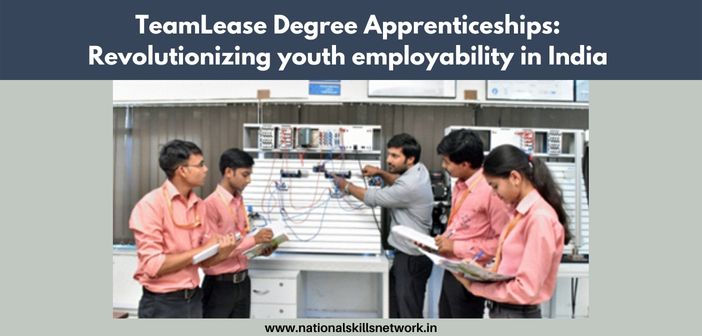
“Through Degree apprenticeships, we wanted to integrate work with education and bring employability aspect to it. So that we can address the issue of skills mismatch between what the industry expects and the skills that students possess”, said Mr Sumit Kumar, Chief Business Officer, Degree Apprenticeships, Teamlease.
Following the developments around apprenticeships and the increasing relevance of work-integrated education, there has been a discussion regarding bringing education and employability closer and degree apprenticeships are one of the best ways to bridge the gap and address the challenge of skills mismatch. To learn more about degree apprenticeships, its benefits and how is it different from the existing apprenticeship schemes in India, we conversed with Mr Sumit Kumar, Chief Business Officer, Degree Apprenticeships, Teamlease.
Below are a few excerpts from our conversation. You can watch the full video interview on our YouTube channel.
Q: What are degree apprenticeships? What distinguishes the Teamlease program from other apprenticeship models currently followed in India?
A: A degree apprenticeship, is an apprenticeship that leads to a degree. They were created to elevate both the educational experience and the apprenticeship. Typically, there aren’t many people interested in taking an apprenticeship since they would prefer to pursue higher education instead. Degree apprenticeships were started with the objective to combine employability and education and increase interest among youth to pursue apprenticeships and ensure that employability factor among apprentices.
The New Education Policy (NEP 2020) was a blessing for us as it gave very clear-cut guidelines. The UGC also came up with guidelines on the degree apprenticeship on how they could be implemented. This is primarily a credit-based system with a blend of on-the-job training plus theory classes. Students are allotted credits for every hour that is spent in learning.
The industry is now getting involved along with academia to curate the programs and has been actively involved in the implementation of these programs which help in creating a talent supply chain. On one hand, the degree apprenticeships address the youth employability crisis, while on the other, it addresses the industry’s skill crisis.
Q: How do you approach the idea of integrating work into education to make apprenticeship initiatives successful? And what are some of the benefits of degree apprenticeships?
A: There are numerous concerns about society, students, and parents. Students drop out of school at every level of their education. Around 80 lakh students are educated, but only 15% continue to the next level of education implying that dropout occurs at every stage.
There are two reasons why people drop out:
- They might not be academically inclined
- They cannot afford to pay for their further education.
Also, India’s unemployment rate ranges between 6-7%. The rest of the population is working but mostly in the informal sector.
Benefits of degree apprenticeships that make the program feasible both for the youth and the industry:
- Learning by doing– Students acquire skills by doing, which immediately leads to employment.
- Earning while learning– Being able to earn a stipend allows students to support both their education and themselves.
- Learning with modularity– The entire course is made up of six modules that last around three years, and students receive a qualification for completing each one. Since the system is entirely credit-based, if someone chooses to opt-out, they can return and resume from where they left.
- Learning with flexibility– This method of delivery uses a variety of models and is not typically carried out in a closed setting. It includes on-the-job learning, on-site learning, online learning, and on-campus learning. On-site learning is also novel in comparison to other methods as participants are actively involved in on-the-job learning, making it difficult for them to return to campus after completing practical training.

Q: Are degree apprenticeships NSQF compliant?
A: Degree apprenticeships are NSQF (National Skills Qualifications Framework)-inclined. It helps apprenticeship grow, which leads to horizontal mobility since they are exposed to different QPs (Qualification Packs) and a combination of several QPs. Therefore, while building this program, it had to be taken to National Council for Vocational Education and Training (NCVET) to make it academically feasible and to make it compliant with regulations and receive a stamp of approval from the regulators, we took it to NCVET. Now, when a person enters the program, they typically have 2 to 3 levels, and by the time they graduate, they have reached NSQF level 6, indicating the growth and level of QPs covered in this program.
Q: With existing apprenticeship programs like NAPS and NATS, which category do degree apprenticeships come under?
A: Degree apprenticeships do not fall under the purview of the Ministry of Education (MOE). In apprenticeship programs from the Ministry of Skill Development and Entrepreneurship (MSDE), those who are taking part are recent graduates, school dropouts, or technical diploma holders. When you look at MOE and MSDE on a broad scale, it is open to undergrads who have typically completed their 12th and undergrads who have received an ITI or diploma. Under NATS (National Apprenticeship Training Scheme), which is under MOE, you would see that we talk about graduate apprenticeship training and diploma apprenticeships. These are persons who have already obtained the degree of a graduate and who completed an apprenticeship of one year before finding employment. What makes this situation different is that an apprenticeship process is more common for graduates and those who have earned a diploma.
Whereas, degree apprenticeships result in a degree. It would still have a significant impact on undergrads, and we can complete degree apprenticeships in both an optional trait and a designated trait. As a result, even if there is a connection to higher education, it falls more under the domain of the MSDE than the MOE.
Q: What is the role of partnerships in implementing degree apprenticeships?
A: Education has always been bilateral. For instance, in a university, there is a student, and in an apprenticeship, there is an apprentice and an employer.
However, the degree apprenticeship has a different arrangement, it is arranged like a tripod with:
- Industry: – Responsible for providing apprenticeships and on-the-job training
- Academia: – Since it is higher education, they must adhere to the UGC guidelines, so we need a body of higher education, such as a university or college, to carry out the theory part of it
- Youth: – Must enrol in that program through the university and have a contract with the employer
Additionally, due to the curriculum and the joint assessment that must be completed to distribute certificates or qualifications, there is a partnership between the employer and the academia. This is another distinctive feature of degree apprenticeship execution because it involves a trilateral rather than a bilateral arrangement.
Numerous institutes must adapt these work-integrated programs in light of the NEP 2020’s current implementation. Every academy body would be required to conduct these programs presently, and to do so, they would also need to place a strong emphasis on industry partnerships. In a similar vein, the industry would also be required to collaborate with academia to examine ways to develop or build talent.
Parents have a significant influence over their children’s education, thus there is room for improvement in this area. Even though there was still more to be done to raise awareness about apprenticeships, I believe that now that there is a connection between higher education and apprenticeships, society should be more accepting of their children enrolling in apprenticeships.
Q: Do you think internships being more widely accepted is adversely affecting efforts to make apprenticeships a more widely accepted form of work-integrated learning?
A: About eight years ago, stipends were not aspirational for students. They were actual stay wages that were being paid and primarily intended for the manufacturing trade zones. With the introduction of the optional trade, the stipends are getting better. In 2019, the stipends were revised and new rules were introduced, making it possible for employers to hire these apprentices for a variety of job roles. Additionally, because the stipends were revised, taking an apprenticeship is now even more appealing to students, though there is still a lot of communication to be done on apprenticeships. It has more to do with following a living example, such as when people notice an increase in the number of neighbourhood students pursuing apprenticeships. However, the trend for apprenticeships has improved; last year, we had 5.5 lakh apprentices, which is a 6 to 7% growth over the preceding two years.
Since we’ve been in business for eight years, we’ve completed around six lakh apprenticeships, of which roughly 75% have earned certification. Of those who have, 98% are now employed formally, earning a wage premium of 40–45% in cash and 100% with benefits associated with employment. This how an apprenticeship leads to formal employment.
Q: What if your message to the youth of India regarding apprenticeships?
A: I would first advise the youth to be more open because it is ultimately about acquiring experience and receiving a stipend. There are numerous opportunities to pursue apprenticeships. Interested candidates can visit the apprenticeship portal by the government, or the TeamLease portal on apprenticeships – apprentices. in. So, we also aim to bridge the gap between how to match supply with demand. Therefore, there are options available, and one should be open to the idea of gaining work experience. A second recommendation is to be more situationally adaptive, eager to adapt and be focused on learning as one enters the industry. These, in my opinion, are the aspects that all potential employers look for when assessing a candidate.













